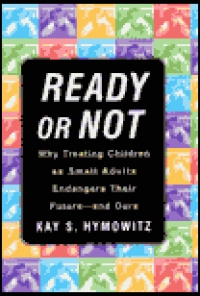Hot Topics
Building Character
What a Character
"Oh My God! I'm my father!" my best friend screamed as he bolted into my dorm room. He had been shaving his beard and had left just the mustache to see how it would look. He ran straight to my bathroom and stood there staring at his reflection in the mirror. "Your mirror is not malfunctioning, my friend," I said, as I looked over his shoulder, "you do look like your father." He quickly shaved off the mustache and headed back to his room. "That was way too scary," he said, "remind me never to do that again." Parents: More Than Just Genes? My friends and I talk about our parents all the time.
Ten Myths About Raising Moral Children In a Complex World
Ten Myths about Raising Moral Children in a Complex World :- 1. My bright, articulate child can distinguish between what she wants and what she needs. 2. It is respectful and appropriate to continue all discussions with my child until she understands my rationale for what I want her to do...or not to do. 3. If they just try hard enough, and receive enough parental support, every child can become a neurosurgeon.
Have We Let The Kids Take Over?

Sherri Mandell reviews Kay S. Hymowitz’s book Ready or Not: Why Treating Children as Small Adults Endangers Their Future-- and Ours
Time Out
Time Out: Is It Right for You?
The first article I wrote for WholeFamily, over two years ago, was about time out. I chose this topic because the issue is relevant to many parents of pre-school children who want to discipline their children without spanking. I also felt, and still do, that time out is one of the most misunderstood and misused methods of child discipline. Over the course of the last two years, I have continued to get questions from parents who are frustrated by trying to get two-year-olds to go to their rooms and parents whose four-year-old children are spending two hours a day sitting in chairs.
Be Good or Else! an Expert Opinion Against Time Out
The idea of "time out" (as described in Time Out: What is it and how can you make it work for you?) goes against everything I believe in as a mother and as a therapist. In fact, the concept of "time out" exasperates me. It sounds more like a program designed for laboratory mice than one that is healthy for children and parents. Why am I so offended by Time Out? Because it denies context.
Time Out: What Is It and How Can You Make It Work for You
Time Out: Look In
When I first heard about the institution of time out, as a very young mother, the concept confused me. "You mean," I asked whoever it was who had told me about it, "that my three-year-old child is supposed to sit in one place -- and not get up -- for over ten seconds?" Like many small children, my son was not inherently capable of sitting still, what with so much to climb and touch and jump on in this world of ours. I am not a fan of many of the more conventional models of kinder-government. Instead, I was searching for a discipline method that best suited my individual child, a very bright and philosophical person for someone who was less than three feet tall.
Time Out: It's Worth The Effort
"If you don't give me that, I'm going to hit you!" my four-year-old said to her three-year-old brother. I was shocked! Why was threatening to hit her brother her first reaction? Why couldn't she at least try asking him nicely? When I thought about it, however, I realized that she was only imitating me and that threatening to smack was how I was keeping the kids in line lately. While I almost never actually gave my children a slap, I realized that lately I had been threatening to do so regularly.
Don't Forget Time In
Everybody seems to be doing time out. Wherever I look I see articles about the pros and cons of the method and descriptions from parents of how it did or didn't work for them. But these descriptions are usually missing the next step: time in. I first saw the term "time in" used in The Discipline Book, by Dr. William Sears. He cautions parents that while time out is an appropriate method of disciplining children, no parent should forget what is equally important to their young child -- time in.
Drugs and Young Children
Who's Drugging The Children?
When I think about using drugs with young children, I always think about Michael. I loved teaching four-year-old Michael. He came in every morning with a great smile on his face, a beautiful laugh and a great big hug for his teachers. Michael loved to sing songs, play running games and build great big buildings out of blocks. But he had a hard time sitting still.
Considering Drug Treatment for Your Young Child? Here's What to Do
More parents than ever before are considering using medication to treat their child's emotional or behavioral difficulties. (See Who's Drugging the Children?) If your physician or your child's teacher recommends medication for your child, consider this option, but carefully weigh the pros and cons of your decision before taking action. With few exceptions, using psychotropic medication with young children should always be a last resort after all alternate methods of treatment are shown to be ineffective or inappropriate.
AD(H)D - Our Story

AD(H)D (Attention Deficit Hyperactivity Disorder) has been a blessing for our family. We are better parents, all our children are successful in their own way, and we are able to be a therapeutic foster family. I sometimes wonder --if we didn't have AD(H)D, would we be so fortunate? There were the years of guilt, frustration, hopelessness, and many other emotions. My son, Ray, was difficult, moody (including drastic mood swings), very unhappy and by age six wanted to "make himself dead.
The Family Bed
Co-Sleeping: Bad for Parents, Bad for Children
I love my children. I love to wrap my arms around them, hold them closely and kiss their soft faces as they sleep at night. But I know that as much as I love them and always want to hold them close, sometimes what a child needs most is his own space. It is for this reason that I feel strongly, as a parent and an early childhood educator that the place for children at night is in their own beds.
Co-Sleeping: Good for Parents, Good for Baby
Twenty years later, I still have vivid memories of my first year as a parent, dreading bedtime. Our daughter would fall asleep with little trouble. That wasn't the problem, especially after my husband and I figured out that waiting for her to fall asleep when she was tired was easier than trying to "put" her to sleep when we were tired. But would she stay asleep for a few hours, or would she awaken to nurse after 45 minutes? We approached every night with apprehension.
Sooner or Later You Sleep In Your Own Space: Opposing The Family Bed
In recent years, there has been a good deal of discussion in support of the family bed. Proponents argue that babies, in particular anxiety-prone infants, both need and deserve parental indulgence, even at night. Moreover, many champions of co-sleeping assert that parental failure to respond to these children will eventually result in needy, anxious, depressed or distant adults.
Bookends by Daybreak: The Family Bed

When our children were young, the family bed conundrum was a big issue for my friends and me. But like all new parents, when my oldest was an infant, I filled my shelves with books on “Parenting by Experts”. The leg up I had on the other moms in the neighborhood was that while many of my friends were getting married and having babies in their early twenties, I was 27 when Sara was born.
The Lazy's Parents Bed
You will see the family bed referred to as "night time nurturing," or "family co-sleeping." Hey come on - let's call it what it is: The lazy parent's bed. And I don't use the word lazy pejoratively. (Everybody else does but they're wrong.) With my first baby, I was vigilant. I wouldn't let him sleep in the bed. I'd nurse him and my husband would whisk him away like an efficient nanny. "He has to be able to comfort himself," I told my husband.
Penelope Leach and Other Experts on The Family Bed
Editor's note: On September 29, 1999, the Consumer Product Safety Commission issued a warning against parents and children sleeping in the same bed. The Commission based its recommendation on research published in the journal Pediatrics showing increased incidence of SIDS, suffocation and strangulation when babies sleep with their parents. The recommendation created a furor. Newspapers, magazines and web sites were filled with the voices of parents and experts who were up in arms.
Child Sees Parents At It
Q Last night, when my husband and I finished making love, we noticed that our six-year-old son was asleep at the foot of our bed. He must have come in while we were making love and fallen asleep. We didn't hear a thing. Was he traumatized? Should we say anything to him? Guest Therapist Elanah Wernik, MSW, answers: A: Your son most probably saw you making love but he obviously felt comfortable enough to fall right back asleep. Most of us have had the experience of waking our children (who have fallen asleep in front of the TV or in our beds) and getting them back to their rooms, speaking with them, giving them a kiss goodnight-- and the next morning the kids don't remember a thing.
Effects Of The Family Bed
Q What are the benefits of letting your child sleep in your bed? A The article on Co-Sleeping in the WholeFamily site mentions a few of the beneficial effects for children who sleep with the parents -- children have a more rested mother, it's good for family bonding, and there seems to be a lower risk of SIDS. The following resources contain information about many studies on the subject. You might be especially interested in the research now in progress by Dr. David Servan-Schreiber and author Maria Goodavage who are surveying mothers, fathers, and children who have "graduated" from the family bed.
Expert-itis
Do The Experts Drive You Crazy?
How many times have you read something written by an expert and thought: Oh, he's an expert. What does he know? He's not here in the trenches with me. Yet, we seem to be a generation of parents hooked on experts. The bookstores are loaded with their books. Magazines feature their words of wisdom. Web sites and radio call-in shows enable you to directly ask them questions. It's understandable. We don't live in a traditional culture anymore when child-rearing do's and don'ts were passed on from Grandma to Mom to us. Things have changed so much since Grandma's and even Mom's time that we often feel their advice is antiquated and ill-suited to today's generation of children.
You Are The Expert
I remember reading my first book on parenthood 25 ago. It was a book about the benefits of natural childbirth, which inspired me to inform my doctor that I wanted to give birth without medication. He explained the wonders of modern painkillers and tried to spare me the torture of a primitive birth. I thought about what I had read, considered the doctor's advice, and found another doctor who would listen to my needs. Since then, I too, have become an "expert." I conduct parenting workshops, prepare couples for childbirth and counsel breastfeeding mothers. My expertise is based on three things: The unfolding of my own personal philosophy as I raised my family of six children, gaining professional status through studying and becoming certified and perhaps most important, separating my personal philosophy from the information and counseling I offer parents, and learning from the parents themselves how different alternatives can be tailored to fit their needs.
Experts: To Trust or Not to Trust?
Beware Of Expert
I Can't Apply All That Good Parenting Advice!
Everyday Blessings: A Review
I've never had a problem understanding the advice given in the "how-to" parenting books. I've just had trouble following it. Whether it is talking-to-my-children-so-they will-listen, a la Faber and Mazlish, or applying Adlerian humanism to family dynamics, there has been a gap between knowing what should be done in a given situation and actually doing it.
Imagination At Risk
Reflections from Ruth: The Value Of Imagination
It's October and we're all turning our attention to costume-making (or hunting) and pretend play. Why is it that children are so excited about Halloween? Why do children love pretend play and more importantly, how should we as parents relate to this excitement? Is encouraging the imagination important to young children and if so, why? To find out more about the crucial role of imagination in childhood, we created an all-new Imagination section. Since reading these thought-provoking pieces, I have a new respect for daydreams, for free time in which to do nothing, for the freedom to let the imagination - perhaps our most powerful mental tool - roam.
Why Are They Just Sitting There?
Eugene and Bonnie are the parents of two kids, Katie, eight and Randy, 13. Eugene owns parking lots, Bonnie works as a prep chef in a local cafe. It's Saturday afternoon. The kids are lazing around and Eugene wishes his kids were out playing and were more active, more like he was as a kid.
Why Are They Always Just Sitting There? A Therapist's Comments
Have you read our drama, Why are they Always Just Sitting There? Eugene is outnumbered in a house full of Bonnies. If Bonnie wants to HELP him, she could imagine what she might feel like in a "house full of Eugenes." Eugene needs to hear recognition for the difficult task of accepting kids who are different from the way he was.
Nurturing Imagination
Yesterday I got down on the floor with my five-year-old son and began to play cars. I did it out of guilt; I felt that I "should" spend time with him. But honestly, I'm not very good at playing cars. I sat down and thought: What are we going to do? My son had no such problem. He smashed and bashed and crashed. He created fires and tornadoes. He took the family on a trip to Africa to visit his dead grandfather.
"Mommy, I'm Bored" What to Do -- or Not Do
Imaginary Playmates
Q :Dear WholeFamily Counselor, I have a six-year-old (one of four girls) who I am a little concerned about. She floats into her own world and talks and plays with imaginary people and it is difficult to get her to snap out of it without tapping her on the shoulder or shaking her. She is so engrossed that she notices little of what is going on around her. However she seems to be managing to find plenty of friends and play normally with them as well. She has been in first grade for two months and seems to be coping OK with that.
Imagination: Childhood's Natural Gift
Brittany's mother wants her to do well in school. She purchased a special series of workbooks designed to help develop cognitive skills in children. Every day when she gets home from work, she sits with Brittany to work on her skills. But despite her mother's best efforts, Brittany usually ends up on the floor screaming and yelling. All she wants to do is go outside, play on the swings and run around the yard.
Imagination: Your Child's Window to The World
The one thing that is obvious to every pre-school teacher is how much young children love imaginative games. When I purchase a new game for my class, some kids get excited. If I buy a new doctor's kit or a fireman costume, well, the whole class lines up for a turn. Ten Ways to Encourage Your Young Child's Imagination By Esther Boylan Wolfson Director, Early Childhood Development Center 1.
Parenting Challenges
Interactive Features
RealLetters
Learn how to express yourself through letter writing- using proven techniques for creating positive relationships.
Family Soap Opera
Join the Austen-Kutchinskys as they struggle to make their new blended family work.
Real Life Dramas
Listen to others struggle with the marital and child-rearing challenges that stump us all.
Crisis Center
Need help with substance abuse, divorce, eating disorders, school failure, teen pregnancy, moving, depression? Visit the Crisis Center
Real Greetings
Family Fun
Fun and educational activities for the whole family.Parent Epiphanies
Great Parenting Tips
Wisdom Of The Ages

